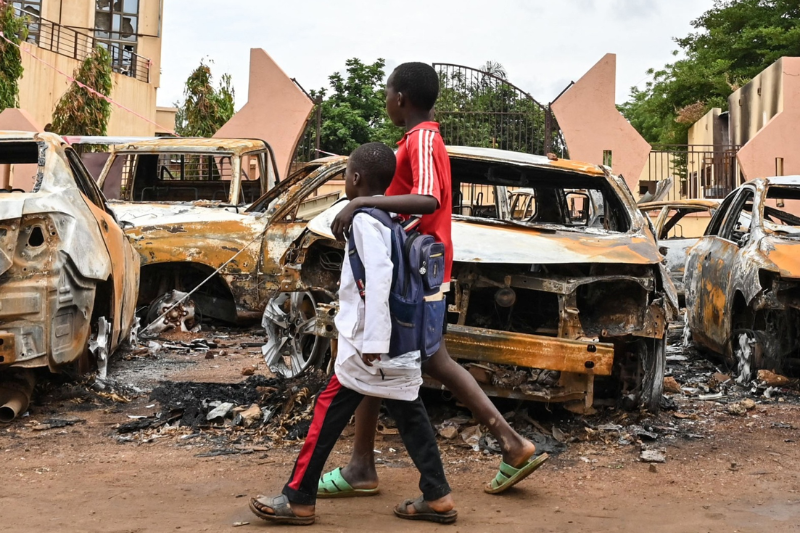Two Western sources who spoke with The Associated Press claim that the Nigerian junta informed a senior US diplomat that it would assassinate ousted President Mohamed Bazoum if neighboring nations attempted a military intervention to restore his authority.
They spoke with the Associated Press not long before the West African bloc ECOWAS said that it had ordered the deployment of an “intervention force” to restore democracy in Niger after its deadline on Sunday passed without Mr. Bazoum being reinstated. Both ECOWAS and the junta, which has demonstrated a willingness to scale up its actions since taking control on July 26, are playing for higher stakes as a result of the danger to the former president who was deposed.
It was believed that Niger was the final country in the Sahel region, which is located south of the Sahara Desert, that Western nations might collaborate with to battle jihadist violence associated with al-Qaeda and the Islamic State organization. This violence has resulted in the deaths of thousands of people and the displacement of millions more. The country is currently experiencing a leadership crisis, and the international community is working feverishly to find a peaceful resolution to the situation.
According to a Western military officer, during her visit to the nation this week, United States Undersecretary of State Victoria Nuland received a briefing from Junta representatives on the threat to Bazoum.
Aneliese Bernard, a former employee of the United States State Department who specialized in African issues and who is now the director of Strategic Stabilization Advisors, a risk advisory organization, said that threats from both sides are increasing tensions but that there is hope that they are coming closer to a discussion. “However, this junta has escalated its actions so rapidly that it is possible that it will do something even more extreme, as it has been the case so far,” she said.
On Thursday, nine heads of state from the 15 countries that make up West Africa got together in the capital city of Nigeria, Abuja, to discuss the next steps. After the talks, the President of the ECOWAS Commission, Omar Alieu Touray, stated that he could only support the choices made by “the military authorities of the sub-region to send a force of ‘community intervention’.
Funding has been discussed, and “appropriate action has been taken,” according to what he said. Omar Alieu Touray pointed the finger of blame at the junta for the problems that have arisen as a result of the sanctions that have been placed on Niger. He also stated that the European Union will take additional actions together. “This is not a contest between one nation and another.” He said that the community has instruments that all of the members have purchased subscriptions to.”
Keep reading
According to a statement given to the Associated Press by a former member of the British army who had served in Nigeria, the announcement made by ECOWAS may be seen as a go-ahead from the regional body to begin gathering their forces with the intention of reestablishing constitutional order. Regarding the employment of physical force, the officer stated that other than the Nigerian soldiers, there was currently nothing else in place. It is quite improbable that Nigerian forces will enter the nation in the absence of triggers and assistance from other regional military forces.
The military junta severed its connections with France and capitalized on the popular resentment of the nation’s old colonial master. She also sought assistance from the Wagner Group, which is based in Russia but has operations in a few countries in Africa and has been accused of committing violations of human rights in those nations. According to Lou Osborn, an investigator working on the project All Eyes on Wagner, which is focused on the group Wagner, Moscow is utilizing Wagner and other channels of influence to try to undermine western nations.
According to Ms. Osborn, the strategies include the use of social media to disseminate rumors, organize demonstrations, and propagate false narratives. She referenced a message that had been posted on Telegram on Wednesday by an accused Wagner agent named Alexander Ivanov, who said that France had initiated the “mass abduction of children” who may be exploited for enslavement and exploitation. She also highlighted a message that an alleged Wagner agent by the name of Alexander Ivanov had posted on Telegram on Wednesday. In response to the AP’s inquiries, neither Wagner nor the Russian government responded.
In the meantime, the estimated 25 million people who live in Niger are beginning to feel the effects of the sanctions. In the nation’s capital, Niamey, several neighborhoods have extremely restricted access to electricity, and power outages are commonplace throughout the entire city. Up to 90 percent of the country’s electricity comes from Nigeria, which has now cut off some of its supply. Nigeria is the country’s largest trading partner.
Hamidou Albade, who is 48 years old, stated that ever since the coup, he has been unable to run his shop in the suburbs of Niamey because there has been no electricity. He also works as a taxi driver, but after many of his international passengers departed town, his business took a significant hit. He stated, “It’s very difficult; I stay at home doing nothing,” which describes his current situation. Despite this, he is a supporter of the junta. “We are suffering right now, but I know that the junta will find a way to get us out of this crisis.”

